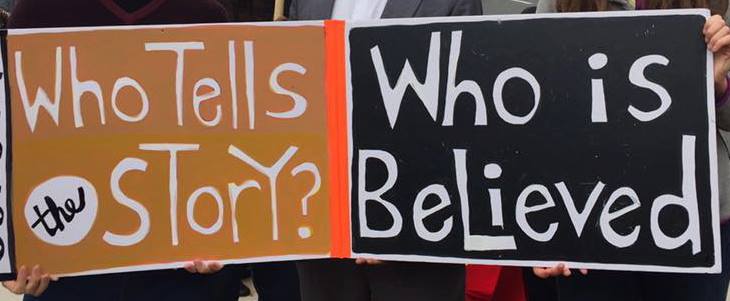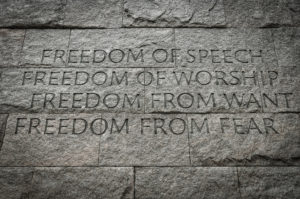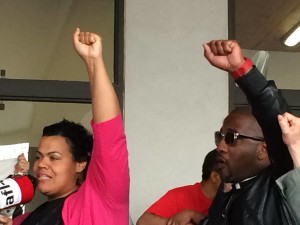Whose Streets?
September 18, 2017“The thing is, cops lie,” my friend says, looking at me sadly from across the table in the café. “They look you in the eye, and they lie to you, right to your face.” Read more →
8 Modes of Resistance for These Times
August 17, 2017The natural response to seeing video or photos of an angry mob carrying torches and shouting racist, anti-Semitic and anti-gay slogans is a sense of revulsion, and perhaps even panic. These are people who are the philosophical descendants of the folks who killed six million “unacceptable” people. And most of us know that we and/or people we love are amongst the unacceptable. We feel threatened, because we are threatened.
And when we feel threatened, our natural response is fight or flight. Our guts tell us to run away or to engage in combat. That’s our native, instinctual response. But you know who else is operating out of an instinctual response? These white men who feel a loss of power and privilege in our increasingly diverse society and fight back with a testosterone-filled fury against the perceived threats to their “right” to power and privilege. They are, of course, horrifically wrong, but they are going with their guts.
We need to respond, but we need to respond with the full weight of our minds and hearts and spirits as well as our guts. Read more →
Choosing When to Pray
November 1, 2016Prayer is an important part of the spiritual lives of many UUs—but we also are clear that people need to choose for themselves how and when they will pray. It isn’t the government’s place to decide that for people.
In the early 1960s the UU Schempp family helped to make that clear in American law. Sixteen-year-old Ellery Schempp wasn’t comfortable with having to say the Lord’s Prayer and listen to Bible readings at his public school. His parents, Ed and Sidney Schempp, talked about the issue with Ellery and his siblings Roger and Donna. Together they decided that not only was it not right for Ellery to have to say a prayer he didn’t believe in, no kid should be required to say a prayer that didn’t match their beliefs or faith tradition.
So the Schempps challenged the school in court, and their case went to the Supreme Court. In 1963 the court ruled in Abington Township School District v. Schempp that it was unconstitutional for a public school to expect students to participate in school-sponsored religious activity. The 1st Amendment of the US Constitution guarantees freedom of religion, and a UU family stood up to make sure that children were included in that guarantee.
What Justice Looks Like
May 2, 2016Sometimes, it is tempting to think about justice only as something “out there,” something that is about causes and actions and social change. But justice is also about how we treat ourselves and the people around us and in our families. The way we treat people individually has a big impact on those larger issues, even if it’s hard to tell right away.
Dr. Cornel West tells us, “Justice is what love looks like in public.” You can tell yourself this quote too, to remind you of why justice is so important. When we work for justice, we are embodying love in our communities; this is how we change the world!
Making Justice Now
May 2, 2016Usually we honor someone from our history who serves as a role model on this page, but there are plenty of UU justice-makers who are living and working right now.
Take, for instance, Lena K. Gardner, who is the Membership and Fundraising Director for our own Church of the Larger Fellowship. Lena is a leader with the Black Lives Matter movement in Minneapolis, Minnesota. She organizes and speaks out and brings people together to protest racist ways that the police have treated Black people in their community and other places around the country.
Working with many other people—many of them young adults or even teenagers, they have protested police killing unarmed Black people and demanded that city officials change policies to hold police accountable.
Always using peaceful strategies, they have held protests in America’s biggest shopping mall and on the highway and in front of a police station.
Some people have objected to the Black Lives Matter slogan, saying that all lives matter. But Lena and many others are pushing people to understand the many ways in which Black people are treated as if their lives don’t matter. They are working for a world where everyone finds fairness.
Support the CLF
Can you give $5 or more to sustain the ministries of the Church of the Larger Fellowship?
If preferred, you can text amount to give to 84-321
Latest Spiritual Reflection Posts
Latest Quest Monthlies
Weekly newsletter
About
Quest for Meaning is a program of the Church of the Larger Fellowship (CLF).
As a Unitarian Universalist congregation with no geographical boundary, the CLF creates global spiritual community, rooted in profound love, which cultivates wonder, imagination, and the courage to act.









